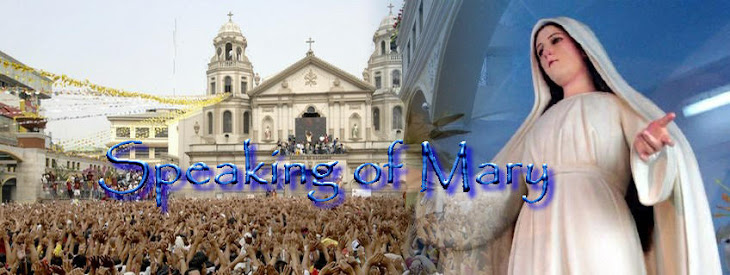Stabat mater dolorosa
Iuxta crucem lacrimosa,
Dum pendebat Filius
She stayed standing there, the Mother,
In sorrow rent, next to the cross,
Lo, with bitter tears overcome, sadness bent,
While on that rood there hung her Son.
IF there are some things that a priest never forgets, it is the times when we have to administer the Anointing of the Sick. Fear and despair are the initial things one would readily notice. Fear of death perhaps, or fear of the unknown more probably, what happens after this life on earth. Or perhaps even a fear more on the part of the family, the fear of losing someone. Yet, one cannot deny that always after administering the Sacrament, there will always be that sense of peace and acceptance, be it from the sick or from the family. Is it because the Church gives that false hope of something better lies hereafter? I think not.
I remember one time I administered the Sacrament to a dying old woman—she was a member of the Third Order of Discalced Carmelites—I never saw someone whose face was so peaceful. In fact, I thought I even saw her face so radiant. She died as she lived: in the intimacy with God. And aren’t we all to pass through the same: we shall die as we have lived?
The efficacy of the Sacraments of the Church is rooted from the One who gave the Sacraments: Christ Himself. If ever we find the Sacraments comforting and consoling it is because it is Christ who comforts and consoles us.
Hence, whenever I administer the Sacrament of the Anointing of the Sick, it would not be too much to really affirm, I act in persona Christi. It is not me nor my presence nor my words that comfort and console the sick and the dying, it is Christ.
Cuius animan gementem,
Contristatam et dolentem,
Pertransivit gladius.
In her grieving spirit,
Sore afflicted and vast empained,
Has a shining, sadding, sword of sorrow
Been soul-blood stained.
Kinakaya ko na lang Father para sa anak ko. I am sure we have heard this said many times over again. And it is the truth. Many of our mothers had to endure sufferings and sacrifices for their children. One can only think of the countless Filipinas who migrate to find work. Or they do not even have to go abroad, how many of our mothers have to go to the urban centers from their rural homes in order to find work. And yes they endure, because they truly love.
We see that the love of Our Lady towards her Son and towards us that enabled her to endure all possible sufferings. She accepted that prophetic sword that pierced her heart because she loves. She loves God foremost, and she loves us because of her love of God. She accepted that the death of Her Son and her sharing in this suffering and death would merit for us the ultimate gift of all, salvation. Kinaya nya para sa kanyang mga anak.
O quam tristis et afflicta
Fuit illa benedicta
Mater Unigeniti!
O how grieved, how sore beset
That most holy Mother of the One
Whom alone saw fit the Father to beget
As beloved, sole-born Son.
Have you ever been in section of the hospital that they administer chemotherapy? Ever seen young people, yes children even, undergoing the therapy? That somehow hidden beneath their suffering bodies, there is beauty shining from their souls reflected in their eyes and faint smile. And one wonders why God gifts a treasure only to slowly and painfully take them away? Why beauty would be decayed right before our human eyes?
And yet the gifts from God would return to God. Why then call them gifts if they have to be returned? I remember that scene in Kung Fu Panda, when the mentor says: The future is mystery, the past is history, the today is a gift that is why it is called present.
A gift is treasured. And as everything is from God, every gift would eventually return to Him. We are gifts to one another, not private properties. Only Him possesses us. And herein lies the difficulty, time comes, and it does come sooner than later, when the gifts of God, that includes you and me, returns to Him. What pains us is that we have come to feel that we own us and one another.
In heaven, with God, I dare speculate, we would come to understand that the gifts of God are to be perpetually and perfectly shared with one another, that includes our entire being. In the Divine Presence, we would come to know that in “losing” ourselves, we gain everything.
Mary was greeted by the Angel as full of grace. Filled with God, emptied of herself. God was able to fill Her entirely with His grace, and became the worthy Mother of God.
Wednesday, April 1, 2009
Subscribe to:
Posts (Atom)

